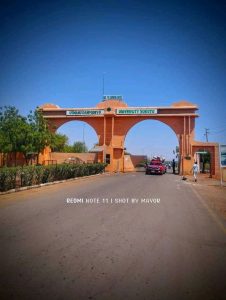By Amanatullah Yusuf

Zakariyau Afisu looked on with awe as donkeys and camels strode by heading to farms. This happens everyday. What even leaves him most surprised is that irrigation is the source of their water and the product of their farms differ from what is produced in his hometown.
The 100-level student of Education and Biology still cannot fathom why almost everyone is on native and why he is mistaken for a Christian for wearing a jean trouser and polo shirt.
However, this is unsurprising in a country that consists of a minimum of 250 ethnic groups with Hausa, Yoruba and Igbo as the three dominant ones. Each group has its own language and custom and accepts one or more of the main religions of Christianity, Islam and African traditional religion.
Each year, hundreds and thousands of students from across states get admitted into Usmanu Danfodiyo University, Sokoto. These students arrive at the Seat of the Caliphate only to be met with a different cultural system_ one that differs from the one they are used to. This leaves them in thought as to whether they are doing it wrong or the residents of Sokoto are doing it wrong.
Cultural Shock
Culture shock refers to the feelings of uncertainty, confusion, or anxiety that people may experience when moving to a new country or experiencing a new culture or surroundings.
This cultural adjustment is normal and is the result of being in an unfamiliar environment. There are four phases of cultural shock: honeymoon stage, anxiety stage, adaptation stage and acceptance stage.

Cultural shock can occur when a person moves to another city for vacation, work or studies, just like the students of Usmanu Danfodiyo University, Sokoto who are from the Southern and Eastern part of the country.
It might be because of the unfamiliarity with the weather, culture, food, dressing among others.
She’s Probably a Prostitute Looking for Customers
Adunoye Suliat, a student of the Department of Education Chemistry still cannot figure out why there aren’t female spaces, either big or small, in school mosques reserved for females.
“She’s probably a prostitute looking for customers or a thief in disguise”, a man said in hausa which was translated to Suliat by a friend who understands the language.
This statement came when she stepped into a mosque on campus to pray which, unknown to her, was for men only.
“Their reaction was the worst. I was mistaken for a prostitute when I entered the mosque,”she said.
Hijabs, Niqab Inside Hot Weather
Abdulrasheed Yusuf, a Biochemistry student was shocked to see the females wearing hijabs in this very hot weather.
He is amazed as to how a girl would wear the hijab, Niqab and socks with the level of heat.
Situated in the dry Sahel covered by sandy savannah and isolated hills, Sokoto City_where Usmanu Danfodiyo University is located_has an annual average temperature of 28.3 °C (82.9 °F), making it one of the hottest cities in the world.
The hot season lasts for about three months_from March to June_with an average daily high temperature above 101°F.
“We men that wear shirts and trousers complain of the heat, how much more so the female wearing hijabs?”
Meanwhile, unknown to Yusuf, this is not the end of his surprises. The difference in their Hausa became another shock to him. He couldn’t fathom how they could be speaking the same Hausa and it is different. Upon asking a Hausa guy,he was told that there are about eight different Hausa which have the same meaning. Yusuf personally observed that they communicate using Hausa but their words differ.
Diversity is a Uniting Force
“Culture determines how people conduct themselves”, Dr Murtala Akanbi Yusuf, a lecturer in the Department of Adult Education and Extension services said.
This diversity is a uniting force. He used the igboland as an example where the men tie wrapper, a practice which would seem weird and almost abominable elsewhere, whereas is norm to them.
“This brings the news to assimilate and acclimatize. There is a need to ask questions in an event of strange happening so as not to offend. The students should sharpen their thought level and tolerate others’ differences in practice and belief. Students should accept ideology,”he added.
Religious Freedom
Before Hassan Hammed, a Medical Laboratory Science came to Sokoto. He thought only the Muslims have the freedom to practice their religion in peace without fear of disruption. This thought was however destroyed after he resumed campus and discovered that the christians have a huge building allocated for them for their Church service and the Sankara for their night prayers.
“I was surprised a popular Muslim state allows for it on their campus”. “The school is trying to balance the equity between the Muslims and the christians”.
